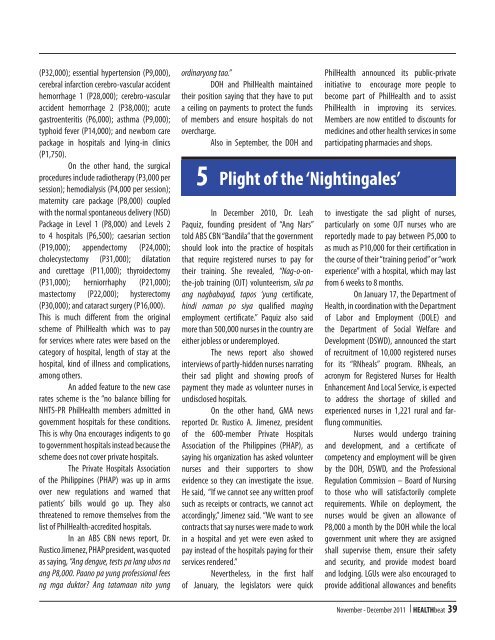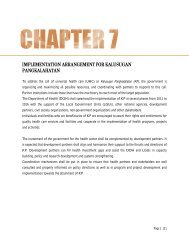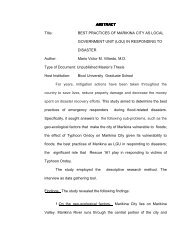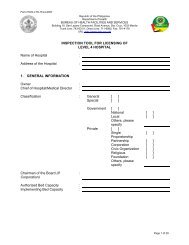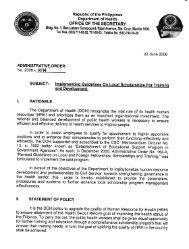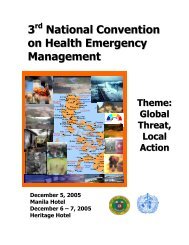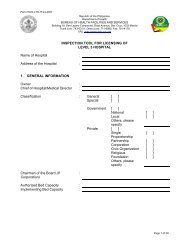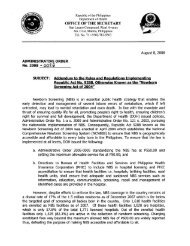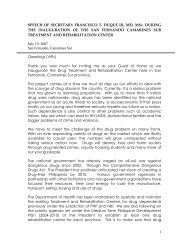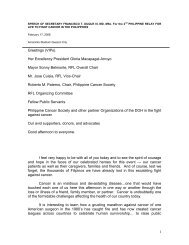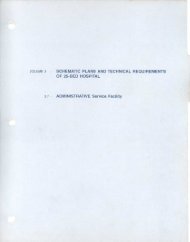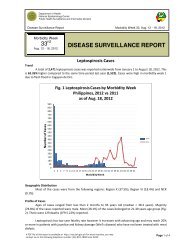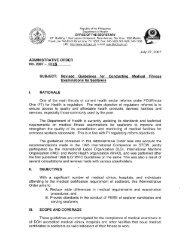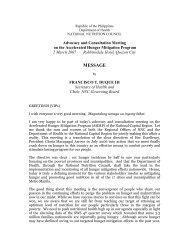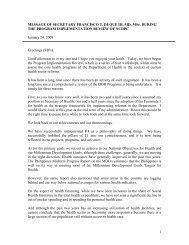Issue No. 67 - November to December 2011 - DOH
Issue No. 67 - November to December 2011 - DOH
Issue No. 67 - November to December 2011 - DOH
- No tags were found...
You also want an ePaper? Increase the reach of your titles
YUMPU automatically turns print PDFs into web optimized ePapers that Google loves.
(P32,000); essential hypertension (P9,000),cerebral infarction cerebro-vascular accidenthemorrhage 1 (P28,000); cerebro-vascularaccident hemorrhage 2 (P38,000); acutegastroenteritis (P6,000); asthma (P9,000);typhoid fever (P14,000); and newborn carepackage in hospitals and lying-in clinics(P1,750).On the other hand, the surgicalprocedures include radiotherapy (P3,000 persession); hemodialysis (P4,000 per session);maternity care package (P8,000) coupledwith the normal spontaneous delivery (NSD)Package in Level 1 (P8,000) and Levels 2<strong>to</strong> 4 hospitals (P6,500); caesarian section(P19,000); appendec<strong>to</strong>my (P24,000);cholecystec<strong>to</strong>my (P31,000); dilatationand curettage (P11,000); thyroidec<strong>to</strong>my(P31,000); herniorrhaphy (P21,000);mastec<strong>to</strong>my (P22,000); hysterec<strong>to</strong>my(P30,000); and cataract surgery (P16,000).This is much different from the originalscheme of PhilHealth which was <strong>to</strong> payfor services where rates were based on thecategory of hospital, length of stay at thehospital, kind of illness and complications,among others.An added feature <strong>to</strong> the new caserates scheme is the “no balance billing forNHTS-PR PhilHealth members admitted ingovernment hospitals for these conditions.This is why Ona encourages indigents <strong>to</strong> go<strong>to</strong> government hospitals instead because thescheme does not cover private hospitals.The Private Hospitals Associationof the Philippines (PHAP) was up in armsover new regulations and warned thatpatients’ bills would go up. They alsothreatened <strong>to</strong> remove themselves from thelist of PhilHealth-accredited hospitals.In an ABS CBN news report, Dr.Rustico Jimenez, PHAP president, was quotedas saying, “Ang dengue, tests pa lang ubos naang P8,000. Paano pa yung professional feesng mga duk<strong>to</strong>r? Ang tatamaan ni<strong>to</strong> yungordinaryong tao.”<strong>DOH</strong> and PhilHealth maintainedtheir position saying that they have <strong>to</strong> puta ceiling on payments <strong>to</strong> protect the fundsof members and ensure hospitals do no<strong>to</strong>vercharge.Also in September, the <strong>DOH</strong> andPhilHealth announced its public-privateinitiative <strong>to</strong> encourage more people <strong>to</strong>become part of PhilHealth and <strong>to</strong> assistPhilHealth in improving its services.Members are now entitled <strong>to</strong> discounts formedicines and other health services in someparticipating pharmacies and shops.5 Plight of the ‘Nightingales’In <strong>December</strong> 2010, Dr. LeahPaquiz, founding president of “Ang Nars”<strong>to</strong>ld ABS CBN “Bandila” that the governmentshould look in<strong>to</strong> the practice of hospitalsthat require registered nurses <strong>to</strong> pay fortheir training. She revealed, “Nag-o-onthe-jobtraining (OJT) volunteerism, sila paang nagbabayad, tapos ‘yung certificate,hindi naman po siya qualified magingemployment certificate.” Paquiz also saidmore than 500,000 nurses in the country areeither jobless or underemployed.The news report also showedinterviews of partly-hidden nurses narratingtheir sad plight and showing proofs ofpayment they made as volunteer nurses inundisclosed hospitals.On the other hand, GMA newsreported Dr. Rustico A. Jimenez, presiden<strong>to</strong>f the 600-member Private HospitalsAssociation of the Philippines (PHAP), assaying his organization has asked volunteernurses and their supporters <strong>to</strong> showevidence so they can investigate the issue.He said, “If we cannot see any written proofsuch as receipts or contracts, we cannot actaccordingly,” Jimenez said. “We want <strong>to</strong> seecontracts that say nurses were made <strong>to</strong> workin a hospital and yet were even asked <strong>to</strong>pay instead of the hospitals paying for theirservices rendered.”Nevertheless, in the first halfof January, the legisla<strong>to</strong>rs were quick<strong>to</strong> investigate the sad plight of nurses,particularly on some OJT nurses who arereportedly made <strong>to</strong> pay between P5,000 <strong>to</strong>as much as P10,000 for their certification inthe course of their “training period” or “workexperience” with a hospital, which may lastfrom 6 weeks <strong>to</strong> 8 months.On January 17, the Department ofHealth, in coordination with the Departmen<strong>to</strong>f Labor and Employment (DOLE) andthe Department of Social Welfare andDevelopment (DSWD), announced the star<strong>to</strong>f recruitment of 10,000 registered nursesfor its “RNheals” program. RNheals, anacronym for Registered Nurses for HealthEnhancement And Local Service, is expected<strong>to</strong> address the shortage of skilled andexperienced nurses in 1,221 rural and farflungcommunities.Nurses would undergo trainingand development, and a certificate ofcompetency and employment will be givenby the <strong>DOH</strong>, DSWD, and the ProfessionalRegulation Commission – Board of Nursing<strong>to</strong> those who will satisfac<strong>to</strong>rily completerequirements. While on deployment, thenurses would be given an allowance ofP8,000 a month by the <strong>DOH</strong> while the localgovernment unit where they are assignedshall supervise them, ensure their safetyand security, and provide modest boardand lodging. LGUs were also encouraged <strong>to</strong>provide additional allowances and benefits<strong>No</strong>vember - <strong>December</strong> <strong>2011</strong> I HEALTHbeat 39


